Presentation
The theme of these sixth Rencontres de Reims in sustainability studies was the “Underground Cities”. This event had taken place on Wednesday 26 and Thursday, October 27, 2016 in Reims (City Hall of Reims).
The sixth edition of the Rencontres Internationales de Reims on Sustainability Science addressed the habitability of underground spaces, and how they can contribute to successful urban transitions to sustainability. Traditionally, the focus in the three-dimensional city is only on height growth. Still, urban subterranean world already host components and networks crucial to ensure a proper functioning of the city. In addition, more and more cities are also designing their future development underground, around the world. They consider underground space to be essential to regulate urban sprawl: Saving land through a better distribution of the urban functions, part of them below the surface. Japanese and Canadian underground developments, in relation with the subway system, made it possible to optimize the necessary public investments through the creation of stores and amenities along the subterranean pathways used by the commuters, which eventually became malls in disguise. More recently, urban land shortage brought about new planning strategies that include what is below the surface: For example, when there is a high property pressure, people start selling or renting their basement as apartments. Master plans start to anticipate long-term underground use —which includes living below the surface— in many cities. The pioneer was Helsinki, which conceived an Underground Master Plan as soon as 2011. Moscow intends to build a “City under Moscow” with boulevards, offices, stores, sports facilities, cinemas, museums and even apartments connected directly to subway and railway stations. In Asia —Chine, Singapore or Japan— number of cities initiated underground development plans.
The potential for urban densification by using the underground space is progressively getting admitted by the local authorities and thus included in public policy agendas. In this conference, we make the assumption that urban planning and design should most definitely engage the depths of the city, as an alternative to urban densification and to externalize nuisances. But actual underground planning —while in progress— suffers from sectored tunnel vision. On the one hand, sectored planning result in the establishment of not connected “underground islands” or “underground patches”. On the other hand, permanent livability of subterranean spaces faces numerous cultural, physiological and technical challenges. Lastly, traditional planning already relegated below the surface the technical facilities and devices that were supposed to be hidden (catacombs, sewers, transport systems, etc.) as well as the activities physiologically “acceptable” without daylight (stores, logistics, etc.). Such a strategic bias coined underground areas primarily as service areas. How could we change this and convert the underground areas into real living places?
This sixth edition of the Rencontres Internationales de Reims on Sustainability Science was in line with the Projet National Ville 10D – Ville d’idées (http://www.ville10d.fr/en/). It called for the co-operation of various disciplines through 4 different topics that will ignite the debates (behavioral and cognitive strategies; landscapes and architecture; energy efficiency and comfort; sustainable planning). The objectives are determining:
- Under which conditions sustainable urban living below the surface is feasible;
- What would be the appropriate planning tools to make it happen?
Three half-day workshops will structure this conference under three headings:
- Underground planning: Wishful thinking or reality?
- Living below the surface: Spatial qualities, usages and types of governance.
- How subterranean areas may foster urban transitions to sustainability?
This conference attempts to shed light on a new urban development process inclusive of what is under the surface. It addresses crucial theoretical issues such as the recycling of urban areas from an “underground perspective”, and tries to design a future for such cities.
Program and videos
Wednesday 26 October 2016
9:30 am – Welcome Speech & Opening
Catherine Vautrin – President of Reims Métropole, Chair of the Association des villes universitaires de France
Guillaume Gellé – President of the University of Reims
François Mancebo – Director of IRCS IATEUR, University of Reims, France
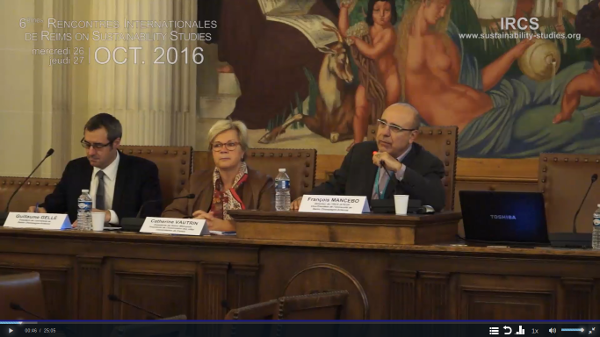
10:00 am – Keynote Speech: Mangroves urbaines, du métro à la ville. Paris, Montréal, Singapour
David Mangin – Urban architect
Marion Girodo
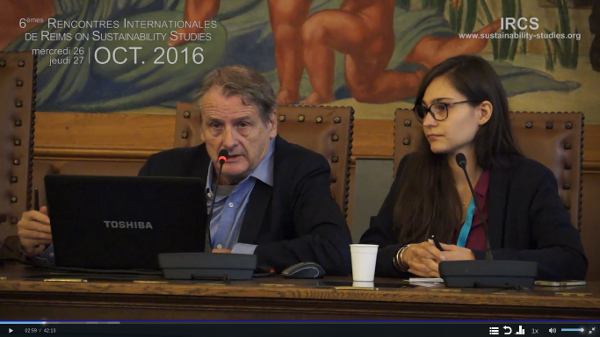
Thematic 1: The underground development: utopia or reality?
Discussant: François Mancebo
10:30 am – La ville du dessous , quels repères pour l’usager de la ville
Alain Bourdin – University professor at the Institut Français d’Urbanisme and director of the Revue Internationales d’Urbanisme
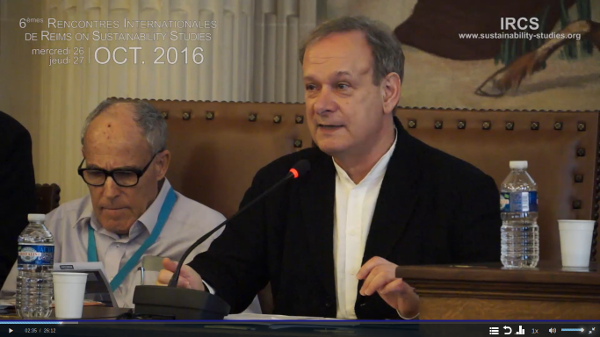
11:00 am – Complexes souterrains à Maresha : La ville souterraine de la période hellénistique dans les contreforts de Judée, Israël
Amos Kloner – Archaeologist and professor emeritus at the Bar Ilan University in Ramat Gan (Israel)
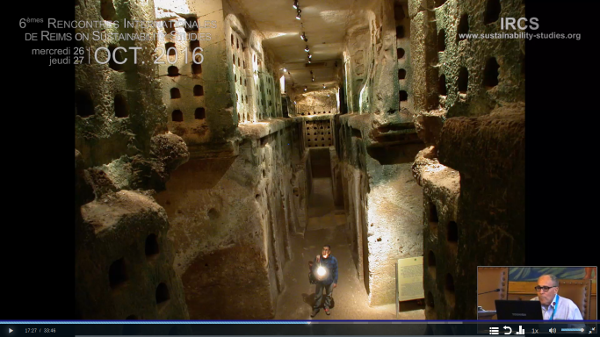
11:30 am – Mines de rien : de la guerre souterraine planifiée en Europe de 1750 à 1916
André Guillerme – Professor of history of technology at the Conservatoire National des Arts et Métiers (CNAM)
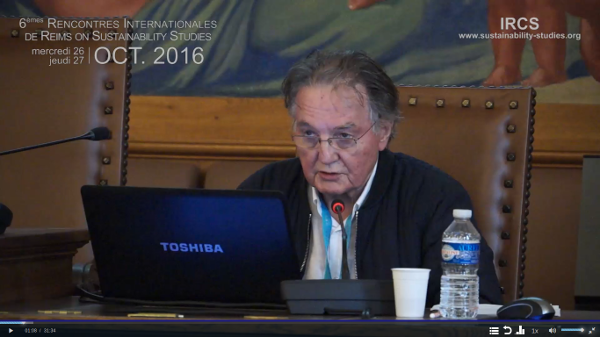
12:00 am – Debate 1
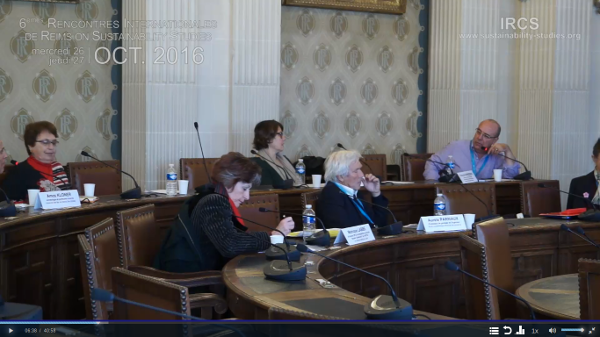
1:00 pm – Lunch break
Thematic 2: Underground space: spatial quality, and governance practices
Discussant: Alain Bourdin
2:30 pm – La spatialité straussienne pour envisager la ville souterraine
Catherine Grout – Professor at the École Nationale Supérieure d’Architecture et de Paysage de Lille (ENSAP) and researcher at the LACTH
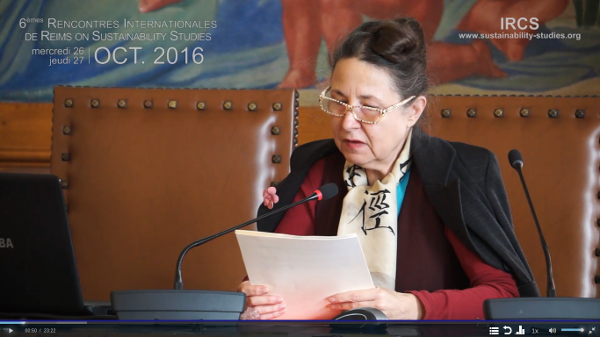
3:00 pm – Parcours souterrains : Aménager à partir des pratiques
Sylvie Salles – Professor of geography and landscape architecture at the ENS Architecture Paris Val de Seine and researcher at the International Research Center on Sustainbility (IRCS)
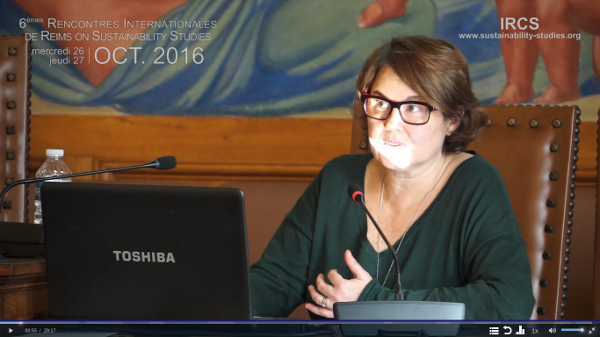
3:30 pm – Navigational memory and environmental orientation: individual differences and strategies
Cecilia Guariglia – Professor at the University La Sapienza (Rome, Italy)
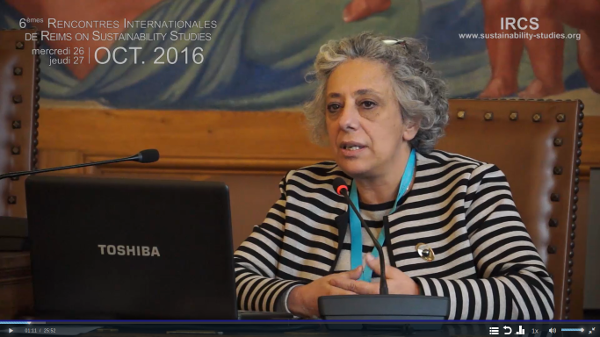
4:00 pm – Debate 2
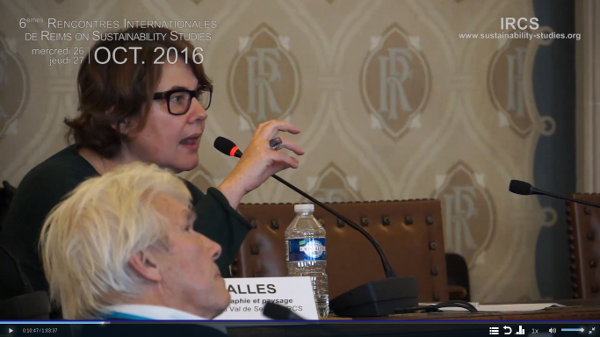
5:00 pm – End of the first day
Thursday 27 october 2016
9:30 am – Welcome
Thematic 3: Underground in transition to sustainable cities
Discussant: Sylvie Salles
10:00 am – Un autre monde en sous-sol : stratégies d’aménagement pour une ville souterraine durable
François Mancebo – Director of the IRCS (International Research Center on Sustainability) and of the IATEUR (Institut d’Aménagement du Territoire, d’Environnement et d’Urbanisme de l’Université de Reims)
10:30 am – La ville souterraine, des conflits environnementaux à de nouvelles synergies
Aurèle Parriaux – Engineering geology professor at the Federal Polytechnic School of Lausanne
11:00 am – Architecture et espaces souterrains : de l’innovation isolée à l’urbanisme connecté
Monique Labbé – DPLG architect and committee chair «Espace souterrain» of the l’Association Française des Tunnels et de l’Espace Souterrain (AFTES)
11:30 am – Debate
12:30 am – End of the Rencontres
Speakers
Alain Bourdin
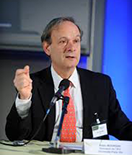
University professor at the Institut Français d’Urbanisme and director of the Revue Internationales d’Urbanisme
Sociologist and urban planner Alain Bourdin has taught at several French and foreign universities and held numerous academic responsibilities.
The main research themes are the changing urban lifestyles, including issues related to mobility and individualization, urban strategy, major urban projects, the organization of the action and local urban action , heritage, and various theoretical questions of the action of sociology. He also developed a consulting activity (in conjunction with large study or design teams), mainly in France.
Co-director of Lab’urba, he is director of the Revue Internationales d’Urbanisme (http://riurba.net/revue/juil-dec-2015/) and has responsibilities in many other journals (Espaces et sociétés, Cahiers internationaux de Sociologie, Revue Internationale d’Urbanisme, Socio – toutes deux en cours de création –, SociologieS, Revue de l’institut de Sociologie (Bruxelles) , Forum Sociologico (Lisbonne)). He currently leads the research program «Plateforme d’observation des projets et des stratégies urbaines» (PUCA – MEDDTL) which brings together a dozen French research teams.
Cecilia Guariglia

Professor of Psychobiology and Physiological Psychology (S.S.D. M-PSI/02) at the Dipartimento di Psicologia of the Universita’ La Sapienza in Roma
Her current research areas are “Visual mental imagery”, “Space cognition and memory”, “Neuropsychology of environmental navigation”, “Individual and gender differences”, “Disorders of space perception and mental representation following brain lesions” and “Brain plasticity and neurorehabilitation”.
Catherine Grout
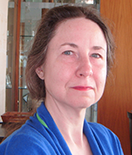
Professor at the École Nationale Supérieure d’Architecture et de Paysage de Lille (ENSAP) and researcher at the LACTH (Laboratoire / Conception / Territoire / Histoire)
Her current research, which focuses on the experience of the works, landscape and «Space Landscape» (E. Straus), public space and spatiality, feed work in phenomenology, psychomotor, politics philosophy and anthropology. She has published Représentations et expériences du paysage (Taipei, Yuan-liou, 2009), L’Horizon du sujet. De l’expérience au partage de l’espace (Bruxelles, La Lettre Volée, 2012)
André Guillerme
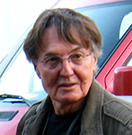
Professor of history of technology at the Conservatoire National des Arts et Métiers (CNAM)
> André Guillerme works on the history and industrial archeology of the urban underground. He published, with Sabine Barles, “The underground urbanism” in 1995, revised edition of Que sais-je? of Edward Utudjan. He co-organized the seventh international congress Space and Urban Underground – EUS95 – and co-published bibliography on underground construction in urban areas in 1996. The occupation of the suburban basement in Western Europe is the theme of his research.
Amos Kloner
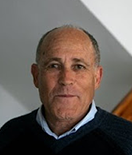
Archaeologist and professor emeritus at the Bar Ilan University in Ramat Gan (Israel)
Amos Kloner is an archaeologist and professor emeritus in the Martin Szusz Department of the Land of Israel Studies at the Bar Ilan University in Ramat Gan, Israel, where he teaches Hellenistic, Roman and Byzantine archaeology.
Kloner led the Israel Antiquities Authority’s excavation of the Talpiot Tomb in 1980.[3]In the 1990s, he was on the team that excavated Beit Guvrin and Mareshah.
The site of Maresha is often related to an underground city. Indeed, research has updated many tombs, some of which the walls were covered in spectacular paintings, but also hundreds of caves form an underground labyrinth consisting of spacious rooms, small rooms, large winding corridors and real industrial.
Monique Labbé
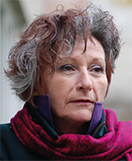
DPLG architect and committee chair «Espace souterrain» of the l’Association Française des Tunnels et de l’Espace Souterrain (AFTES)
Monique LABBÉ is an architect, graduated from the Ecole Nationale Superieure des Beaux-Arts in Paris and ICH (housing estate building) at Conservatoire national des arts et métiers.
She runs her agency, “The Monique LABBÉ Workshops” composed of fifteen employees in Ivry-sur-Seine, south of Paris.
For 30 years, the company has specialized in:
- public infrastructure (specifically schools)
- environmental infrastructure such as sorting centers and water treatment,
- industrial buildings.
Its architecture is committed to the integration and enhancement of any type of program in sensitive landscapes, urban or peri-classified areas.
Monique LABBÉ devotes much of his work in raising awareness and promoting the use of underground spaces as potential areas of urban planning.
Since 2005, she is President of the “Underground Space Committee” AFTES (the French Association of Tunnels and Underground Space), a member of ITA (International Association of Tunnels and Underground Space) . In this context, it is regularly involved in national and international conferences.
Moreover, since 2009 Monique LABBÉ initiated and runs a National Research Project “Ville10D City of ideas” (cf. www.ville10d.fr) supported by the MEDDE (Ministry of Ecology, Sustainable Development and Energy). This applied research is aimed at developing the conditions for a new type of planning city planning and thus to promote a wider and effective use of underground space.
This project brings together about fifty researchers and stakeholders in the building partners: clients, public and private contractors, construction companies, engineering firms, engineering firms, public and private laboratories, universities and engineering schools.
François Mancebo
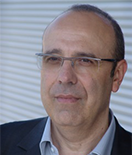
Director of the IRCS (International Research Center on Sustainability) and of the IATEUR (Institut d’Aménagement du Territoire, d’Environnement et d’Urbanisme de l’Université de Reims)
Professor of urban planning and sustainability at the University of Reims, co-director of the laboratory Habiter, François Mancebo is also co-lead faculty in the IHDP Earth System Governance and was holder of the Chair of Contemporary France to the University of Montreal.
His research focuses on transitions to sustainability in urban areas, particularly in terms of the conflicts in the implemented sustainable policies, and with particular interest in issues of social justice and climate change adaptation.
David Mangin
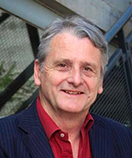
French urban architect, Grand Prize of urbanism 2008, professor at the École d’architecture de Versailles and École d’architecture de la ville et des territoires at Marne-la-Vallée and the École nationale des Ponts et Chaussées.
David Mangin teaches urban project. Architect and urban planner, he is associated with the agency Seura since 1989 (Florence Bougnoux, Jean-Marc Fritz), participates among others in the development of public spaces in Paris, Bordeaux, Marseille, Lille, Toulouse and Mulhouse.
He works on large urban projects in France that integrate the mutation of large shopping centers or commercial wasteland: Les Halles in Paris, the Pont district Donkey-Monthieu in Saint-Etienne, the eco-neighborhood of Raquet in Douai, the TGV Zac] in Mulhouse, the Seine Ardoines Sector in Vitry (France).
Since 2011, he worked on the project design and construction of facilities and equipment of the Aerospace Campus in Toulouse, the strategic project of cross-border development Ferney-Voltaire-Saconnex and participated in the preparatory mission Aix-Marseille Provence Métropole.
With the agency Seura, he has completed numerous housing projects (Brulon-Citeaux, Lilac, Grande-Synthe, Rouen…). He participated at the International Consultation on the Greater Paris in the group Descartes for AIGP1, then head of the team Seura for the AIGP2: Living the Grand Paris (season 1) and Metropolitan System (season 2). It conducts trade missions with the State of São Paulo on improvement programs “informal settlements”.
David Mangin is also a member of the scientific advice of the du Plan Urbanisme Construction Architecture, member of the AIGP (Atelier International du Grand Paris), member of the editor team of the revue d’urbanisme and of the Fabrique de la Cité (Vinci group).
Aurèle Parriaux
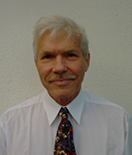
Engineering geology professor at the Federal Polytechnic School of Lausanne
Director of Geology Laboratory for Engineering and the Environment (GEOLEP), Aurèle Parriaux leads a team of about twenty people. His research and those of its employees focus on: Sustainable management of urban underground (often the last area of freedom of the city), its potential space resources, water, geothermal energy and geomaterials; Unstable slopes hydrogeology; Geological typology for natural hazards; The behavior of cataclastic rocks (rocks heavily crushed) in underground work; Geochemical marking of groundwater by trace elements, to determine their origin
The management of groundwater in terms of quantity and quality.
Alongside the research, Professor Parriaux produced experts in various fields of engineering geology and environment.
It is also active in several international organizations. He chaired the Swiss Society of Hydrogeology for 6 years. From 2001 to 2006 he was director of the Civil Engineering Section of the EPFL.
Sylvie Salles
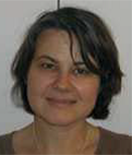
Professor of geography and landscape architecture at the ENS Architecture Paris Val de Seine and researcher at the International Research Center on Sustainbility (IRCS)
His research focuses on the relationship between urban planning, landscape and the environment. Sylvie Salles is particularly interested in the contributions of the culture landscape in the transition towards environmental development projects. His work on public spaces and green infrastructure focuses on the links between urban, suburban and rural areas through urban ecology. She is a member of the scientific committee of two journals: « Projet de paysage » and « Cahiers thématiques du LACTH »

